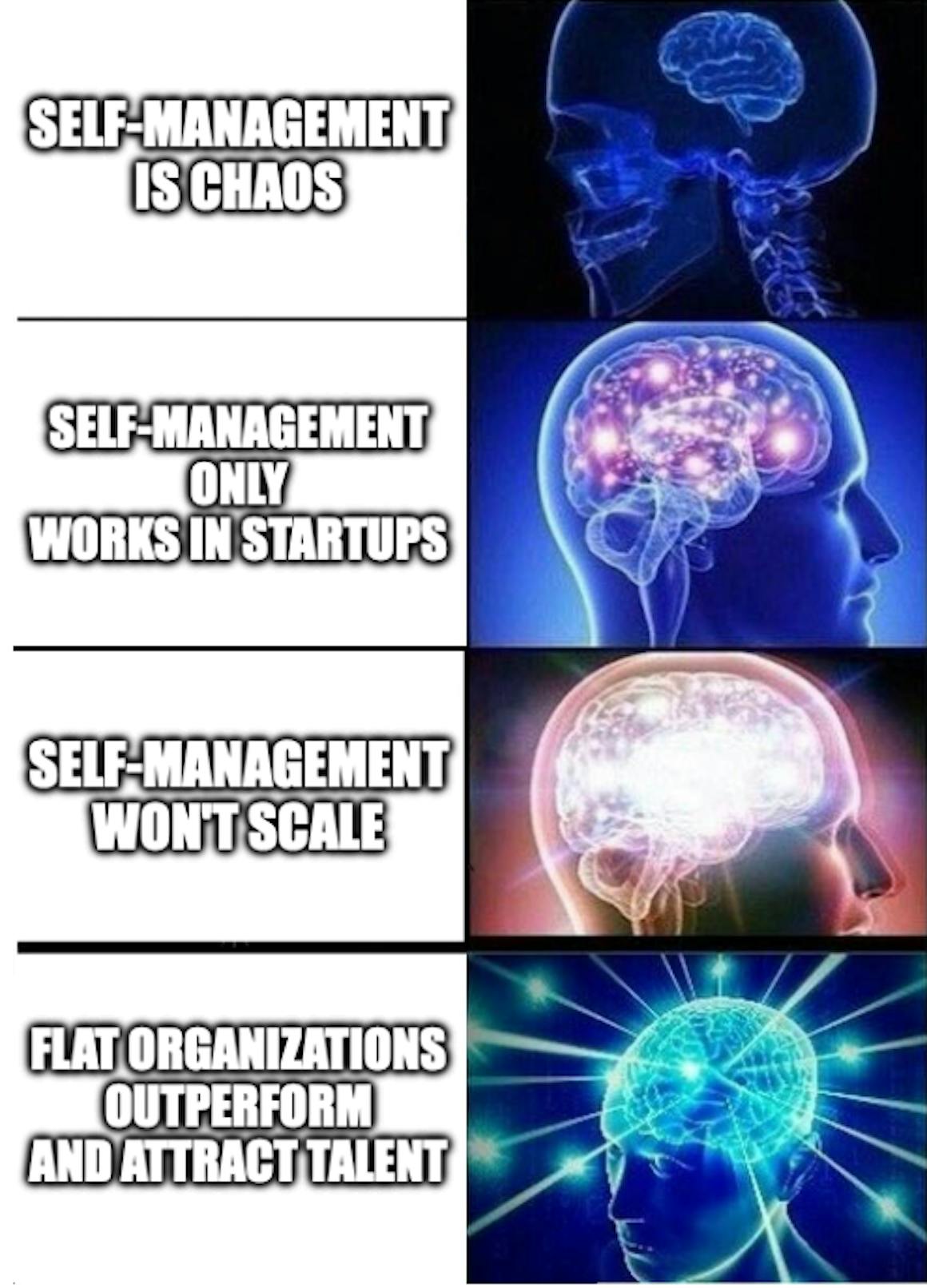Flat Organizations Aren't a Fad. They Are The Future.

Last week, I was in China on a business trip. One of the highlights? A visit to the progressive powerhouse Haier in Qingdao.
While there, I spent hours on the road. In electric cars. Surrounded by electric cars. Curious, I looked it up. Turns out: almost half of all new passenger cars sold in China today are electric.
It reminded me of something Jeremy Clarkson once said:
“I’ve got probably 10 cars, all with V8 engines. I don’t think electric cars solve anything.”
Classic Clarkson. But also: classic resistance to change.

The pattern of paradigm shifts
Clarkson isn’t just wrong. He’s illustrative. A symbol of resistance in the face of a paradigm shift. The same way German Kaiser Wilhelm II scoffed in the early 20 century:
“I believe in the horse. The automobile is a transitory phenomenon.”
Whether he said it or not (it’s highly debated), the quote stuck. Because it captured a now-extinct worldview: that the horse-powered economy would reign forever.
Sounds familiar?
Fast forward a century. Today’s version isn’t about horses and cars. It’s about gas versus electric.
And in the workplace? It’s about hierarchy versus self-management.

From command & control to freedom & trust
In the corporate world, the horse is the traditional hierarchy. The car? It’s the flat organization.
And today’s Wilhelm? The legacy manager armed with an MBA. Obsessed with KPIs and fluent in spreadsheets and budgets.
To them, self-management is a joke. Flat structures are just idealistic. And decentralized decision-making is outright dangerous.
Or what we typically hear from legacy managers:
“That may work at some utopian startup. But it will never work in a real business.”
Same reaction Ken Olson (former CEO of DEC) had in 1977:
“There is no reason anyone would want a computer in their home.”
Olsen helped shape the tech world. But he couldn’t see the shift. Not because he was dumb. But because he was stuck in an old paradigm that still made sense to him.
The future never asks permission
That’s the tricky thing about paradigm shifts. They don’t look serious. Until they are. And by the time the skeptics realize what’s happening, it’s too late.
Sure, hierarchies have their function. They bring structure. And allow for scalability and predictability.
But in today’s world, where complexity moves fast and knowledge lives at the edges, they’re starting to look like horse-drawn carriages on a six-lane highway.
Still, many legacy leaders cling to them. Not out of fear. But because the system is them.
They succeeded by controlling through the hierarchy. They were rewarded for the stability it provided. And they were taught to lead from the top down.
The quiet revolution
No wonder the skeptics still scoff. In the corner offices they still mutter, “This won’t scale.”
They say it doesn’t work. While their own people are already exploring and doing it.
It’s the same pattern again. First they laugh. Then they fight. Then they… hedge.
And finally, they fade. Not with a bang, but with a reorg memo and a cautious LinkedIn post about “embracing agility.”

What's growing beneath the surface
Because while hierarchies wobble, something else grows. An increasing number of companies are thriving without middle managers: many of them part of our Rebel Cell network.
These companies aren’t fringe experiments. They’re outperforming their counterparts. And they’re attracting top talent.
In fact, as I write this, I’ve just returned from an inspiring trip to Munich, where I visited the self-managing company Metafinanz: a ~850-person firm that got rid of its managers back in 2017 and now organizes itself into 80 autonomous units.
Despite their scale (and despite being highly successful) Metafinanz remains relatively unknown outside of Germany. We only discovered them ourselves recently.
But their story is proof: there are more self-managing companies out there than you might think.
So the next time someone says,
“Flat organizations are a fad.”
Just smile.
And remember Clarkson. Remember Wilhelm. Remember Olsen.
They weren’t dumb. They were just stuck.
And the future doesn’t wait.
Ready to be future-ready?
At the start of this newsletter, I mentioned my visit to Haier: the Chinese progressive powerhouse. Haier didn’t stumble into all of this. They designed for it.
They are organized into thousands of micro-enterprises. They are radically decentralized and run on a culture where entrepreneurship isn’t a buzzword. It’s their operating system.
Sure, it’s not perfect. It’s not easy. But it works for them.
Want to learn how?
Join our Corporate Rebels Masterclass: a 6-week deep dive into progressive organizational design.
We explore real-life cases like Haier, Buurtzorg, and other pioneering the future of work.
Our next cohort kicks off in Fall ’25.
If you’re serious about ditching outdated playbooks and designing organizations that actually work for people, then this is for you.
Let’s stop riding horses on the highway.

